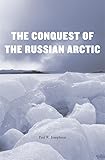The Conquest of the Russian Arctic / Paul R. Josephson.
Material type: TextPublisher: Cambridge, MA : Harvard University Press, [2014]Copyright date: ©2014Description: 1 online resource (453 p.) : 15 halftones, 4 maps, 5 tablesContent type:
TextPublisher: Cambridge, MA : Harvard University Press, [2014]Copyright date: ©2014Description: 1 online resource (453 p.) : 15 halftones, 4 maps, 5 tablesContent type: - 9780674728905
- 9780674419827
- 947/.1084 23
- G615 .J67 2014eb
- online - DeGruyter
- Issued also in print.
| Item type | Current library | Call number | URL | Status | Notes | Barcode | |
|---|---|---|---|---|---|---|---|
 eBook
eBook
|
Biblioteca "Angelicum" Pont. Univ. S.Tommaso d'Aquino Nuvola online | online - DeGruyter (Browse shelf(Opens below)) | Online access | Not for loan (Accesso limitato) | Accesso per gli utenti autorizzati / Access for authorized users | (dgr)9780674419827 |
Frontmatter -- Contents -- Illustrations and Tables -- Note on Transliteration -- Introduction -- 1. Charting the Arctic Landscape -- 2. Neither Cod nor Coal -- 3. The Role of the Gulag in Arctic Conquest -- 4. The Arctic Sciences of Places and People -- 5. The Nickel That Broke the Reindeer's Back -- 6. Transformation of Taiga and Tundra -- 7. Rediscovering the Arctic -- Notes -- Acknowledgments -- Index
restricted access online access with authorization star
http://purl.org/coar/access_right/c_16ec
Spanning nine time zones from Norway to the Bering Strait, the immense Russian Arctic was mostly unexplored before the twentieth century. This changed rapidly in the 1920s, when the Soviet Union implemented plans for its conquest. The Conquest of the Russian Arctic, a definitive political and environmental history of one of the world's remotest regions, details the ambitious attempts, from Soviet times to the present, to control and reshape the Arctic, and the terrible costs paid along the way. Paul Josephson describes the effort under Stalin to assimilate the Arctic into the Soviet empire. Extraction of natural resources, construction of settlements, indoctrination of nomadic populations, collectivization of reindeer herding--all was to be accomplished so that the Arctic operated according to socialist principles. The project was in many ways an extension of the Bolshevik revolution, as planners and engineers assumed that policies and plans that worked elsewhere in the empire would apply here. But as they pushed ahead with methods hastily adopted from other climates, the results were political repression, destruction of traditional cultures, and environmental degradation. The effects are still being felt today. At the same time, scientists and explorers led the world in understanding Arctic climes and regularities. Vladimir Putin has redoubled Russia's efforts to secure the Arctic, seen as key to the nation's economic development and military status. This history brings into focus a little-understood part of the world that remains a locus of military and economic pressures, ongoing environmental damage, and grand ambitions imperfectly realized.
Issued also in print.
Mode of access: Internet via World Wide Web.
In English.
Description based on online resource; title from PDF title page (publisher's Web site, viewed 30. Aug 2021)


